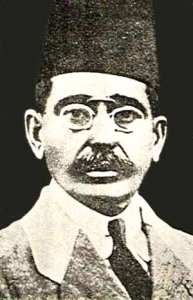Iradsch Mirza
Iradsch Mirza (* October 1874 in Tabriz ; † March 12, 1926 in Tehran ; Persian ایرج میرزا, DMG Īraǧ Mīrzā , called Jalāl-ol-Mamālek ) was a well-known Iranian poet. He distinguished himself as a modern-thinking poet, who criticized the traditions in his works and was an advocate for the emancipation of women.
Life
Iradsch Mirza was born in October 1874 in the northwestern Iranian city of Tabriz. According to his family tree, he is a descendant of the Qajar king Fath Ali Shah († 1834); his father, Prince Gholam Hossein Mirza , was the son of Malek Iradsch Mirza , who in turn was the son of the Qajar ruler. Iradsch's father Gholam Hossein was the official court poet of Mozaffar ad-Din Mirza , crown prince and son of the Qajar king Naser ad-Din Shah .
Mirza was tutored by private tutors with whom he learned Persian, Arabic and French, and later he also attended the Dar-ol Fonun Polytechnic in Tehran. Already at this time he wrote poems, whereupon the Crown Prince's court became aware of his talent and at the age of 14 awarded him the title Sadr os-So'ara ("Head of the Poets"); he was also well versed in the art of calligraphy . He married at 16, but three years later he lost his wife and father, whose position as court poet he finally took over.
A few years later he left the royal court and worked in the office of the governor of East Azerbaijan , Ali Khan Amindouleh. Between 1901 and 1904 he worked in the customs office of the city of Kermanshah. In 1905 Mirza accompanied Amindouleh to Tehran, where he became part of the constitutional movement.
literature
- Bozorg Alavi : History and Development of Modern Persian Literature , Akademie Verlag 1964;
Web links
- IRAJ MIRZĀ in the Encyclopædia Iranica
- Literature by and about Iradsch Mirza in the bibliographic database WorldCat
Individual evidence
- ^ A Brief History of Persian Literature Iran Chamber Society
| personal data | |
|---|---|
| SURNAME | Mirza, Iradsch |
| ALTERNATIVE NAMES | Mīrzā, Īraǧ; Jalāl-ol-Mamālek; Jalal-ol-Mamalek; ایرج میرزا (Persian) |
| BRIEF DESCRIPTION | Iranian poet |
| DATE OF BIRTH | October 1874 |
| PLACE OF BIRTH | Tabriz |
| DATE OF DEATH | March 12, 1926 |
| Place of death | Tehran |
